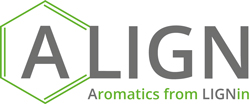Our projects

Funded by the German Federal Ministry of Education and Research (BMBF) from 2018-2021 with 1.8 M EUR.
Read more
The production of aromatics is crucial for the chemical industry. Currently, virtually all aromatic building blocks are produced from fossil oil. However, the availability of aromatic hydrocarbons from fossil sources will decrease, as less crude oil will be refined for energy use. The resulting gap between supply and demand can be met by using bio-based, renewable feedstocks to produce aromatics. This is addressed in the BIG-Cluster project ALIGN. It targets highly functionalised bio-based aromatics, which can be used in many different fields of applications, such as coatings, adhesives, or cosmetics.
The ALIGN Project started in April 2018 and combines experts in the field of bio-based aromatics from academia and industry. It deals with the conversion of lignin to bio-based aromatics with a high market value. The consortium consists of three partners with extensive expertise in lignin extraction and depolymerisation (Fraunhofer CBP, KU Leuven, LXP), one partner conducting downstream processing procedures (VITO) and three partners focusing on potential applications (Axxence Aromatic, Phytowelt Green Technologies, UPM Biochemicals) to produce high-pressure-laminates as well as natural vanillin for food and beverages. The German project partners will receive 1.3 m EUR from the Federal Ministry of Education and Research (BMBF).
The ALIGN Project started in April 2018 and combines experts in the field of bio-based aromatics from academia and industry. It deals with the conversion of lignin to bio-based aromatics with a high market value. The consortium consists of three partners with extensive expertise in lignin extraction and depolymerisation (Fraunhofer CBP, KU Leuven, LXP), one partner conducting downstream processing procedures (VITO) and three partners focusing on potential applications (Axxence Aromatic, Phytowelt Green Technologies, UPM Biochemicals) to produce high-pressure-laminates as well as natural vanillin for food and beverages. The German project partners will receive 1.3 m EUR from the Federal Ministry of Education and Research (BMBF).

Funded by the German Federal Ministry of Education and Research (BMBF) from 2018-2021 with 1.5 M EUR.
Read more
The project BioCOnversion started in April 2018 and aims at developing and implementing a sustainable process from carbon monoxide (CO) to a defined polymer precursor by evaluating different technologies. In an international consortium, industrial and academic partners join their high-level, multidisciplinary expertise to develop a microbial bioconversion process comprising the primary conversion of CO/syngas into an intermediate alcohol through gas fermentation and the enzymatic upgrading conversion into the polymer precursor.
The project focusses on developing technologies for the individual process steps and on the conceptional design of the overall process. In a first phase, the individual process steps will be independently developed. Then, their performance will be evaluated by techno-economic assessments and life cycle analysis. Based on these results, the overall process will be experimentally validated and further optimised. A final process evaluation will be done from a techno-economic viewpoint along the whole development chain. BioCOnversion is coordinated by CLIB and unites several innovative providers of conversion and recovery technologies – making a high-value building block available from a CO-based, climate friendly process.
The project focusses on developing technologies for the individual process steps and on the conceptional design of the overall process. In a first phase, the individual process steps will be independently developed. Then, their performance will be evaluated by techno-economic assessments and life cycle analysis. Based on these results, the overall process will be experimentally validated and further optimised. A final process evaluation will be done from a techno-economic viewpoint along the whole development chain. BioCOnversion is coordinated by CLIB and unites several innovative providers of conversion and recovery technologies – making a high-value building block available from a CO-based, climate friendly process.

Funded by the German Federal Ministry of Education and Research (BMBF) from 2018-2022 with 186,000 EUR.
Read more
CROSSBEE tackled the challenge of combining diverse disciplines and expertise in different fields relevant for bioeconomy under the coordination of CLIB within a four year project funded until 2022. CROSSBEE implemented two activities in the BIG-Cluster region: Within the Massive Open Online Course (MOOC) “Biobased Products for a Sustainable (Bio)economy”, students from all over the world learned bioeconomy basics and discovered state-of-the-art biobased product examples. The MOOC was first published in January 2019 and attracted more than 8,000 learners worldwide in three runs. Within the student competition Global Biobased Business Plan Competition (G-BiB), the student teams have been trained individually in competencies and skills relevant for entrepreneurship and thus learned to think outside the scientific box. Teams from Germany, Belgium, Finland, and the UK took part in the competition. In Germany alone 10 teams have been supported of which 4 already founded a company during the project lifetime.